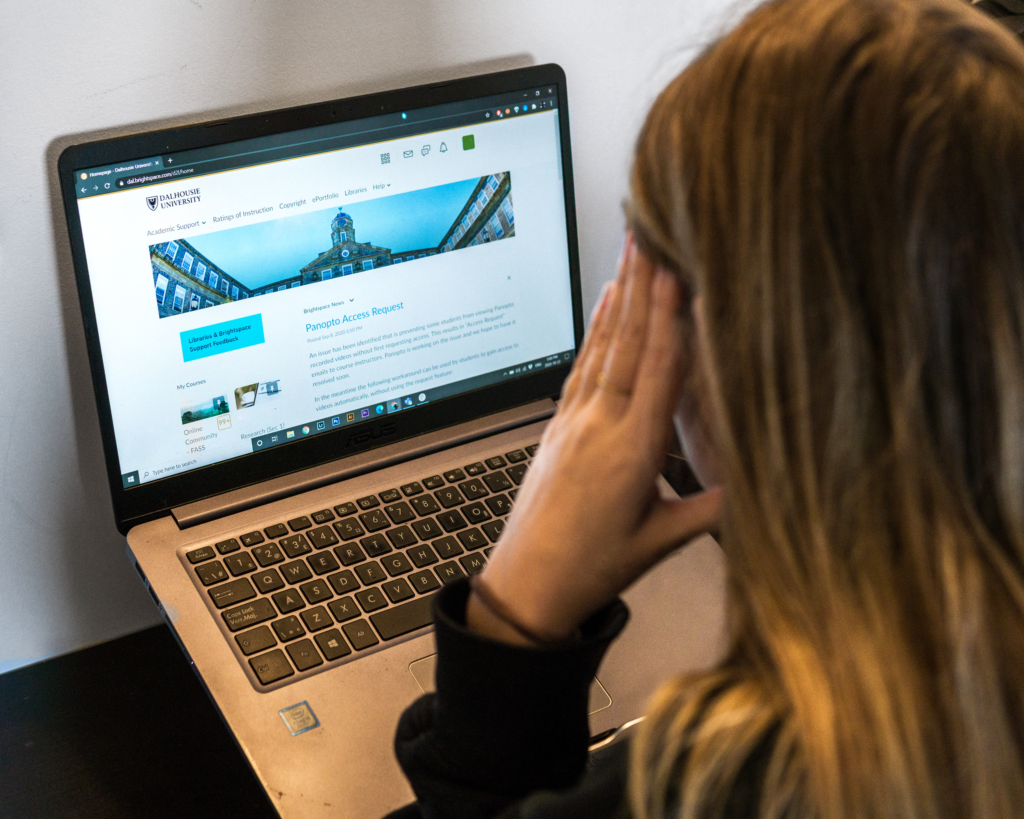A recent survey from Mental Health Research Canada showed Nova Scotians were more likely to experience high levels of anxiety and depression following the start of the COVID-19 pandemic than Canadians in other provinces.
This finding can be reflected in the Dalhousie University community, where faculty and students are feeling the toll of COVID-19 and the transition to online courses on their mental health and general well-being.
The new student experience
Cory Williams, a fourth-year history and political science major at Dal is completing the fall term at his home in Ontario as opposed to in Halifax.
“It’s been rough,” Williams said. “I’m relying solely on myself to succeed and I don’t have the same support systems I would have had if I was on campus.”
Williams said trying to focus while sitting in front of his laptop all day only encourages him to procrastinate and let deadlines pile up, which creates a paralyzing state of anxiety and stress.

“You lay in bed at the end of the night and think ‘Wow, I did nothing today, but I have so much work to do,’” said Williams. “I just end up using cannabis and video games as a distraction.”
David Pilon, director of counselling and psychological services at Dalhousie’s Student Health and Wellness Centre says Williams isn’t the only student feeling this way.
He says many students have expressed they’re struggling to keep up with their academic requirements, and he worries about their well-being as they try to manage the stresses of living through a pandemic while adjusting to a brand new way of learning.
“It’s not uncommon that we all might have expectations of ourselves in terms of our productivity and performance,” said Pilon. “When things change around us, and when we [become] more stressed, it may be important to adjust our expectations accordingly.”
Hannah Pletz, a third-year political science major, has been trying to take advantage of the pandemic to do just that, but it hasn’t been easy.
“I’ve been practicing being OK with letting my brain shut off, and if that means I need to stop being productive at noon on a Wednesday, so be it,” she said, “but even when you do take breaks. . . you’re just sitting in the same place. Nothing actually feels like rest.”
Pletz says her struggles with obsessive-compulsive disorder have made the reality of a global pandemic “particularly not fun.”
“I tend to take things more seriously than most people do, which tends to put me in a state of more isolation or anxiety,” she said. “I spend too much time in my room.”
Harmony Adesola, a second-year cinema and media studies student says he doesn’t even bother getting dressed some days.
“I dread those [morning] Zoom lectures,” he says, “Normally I would wake up, eat breakfast and put effort into how I look for my classes, but now what’s the point?”
Bunker mentality
Nina Woulff, a Halifax-based psychologist and assistant professor for the department of psychiatry at Dalhousie, calls what Adesola is experiencing the “bunker mentality.”
“[Bunker mentality] is like when you’re in a war and you have to go underground, but you just stay there for your own safety,” said Woulff.
Although people with pre-existing anxiety disorders are more prone to the bunker mentality, Woulff says, she has noticed it among everyone since the start of the pandemic.
“None of us have ever experienced such a pervasive event. . . It’s universal,” she said. “COVID does not discriminate.”
Professors don’t have it much better
Brad Wuetherick, the executive director of the Centre for Learning and Teaching, says it’s important to remember students aren’t the only people trying to cope with stress brought on by online school.
“Teaching in this moment is particularly stressful,” said Wuetherick. “Many instructors have never taught online before, so there’s a level of stress and anxiety that goes with trying to prepare for courses.”
Services available
Woulff’s private practice shifted to offering primarily online counselling. Dalhousie’s Student Health and Wellness Centre has also transitioned to online services.
Both Polin and Woulff say online counselling can be just as effective as face-to-face counselling, but students are craving in-person interaction.
“We went to almost zero referrals for four to six weeks,” said Woulff. “Even current clients didn’t want to transition online.”
Woulff says Dalhousie’s faculty and staff have especially felt the effects of the pandemic and the way it changed treatment.
“I think for many of the professors, this has been awful,” she says. Some Dal professors are patients at Woulff’s private practice, where “they all beg to be seen in person,” she said.
“We’ve never been through a situation like this that has so significantly transformed university and day-to-day life,” says Pilon. “Without a past to look back on, it is hard to say what the future implications of living through this pandemic will be.”


Recent Comments